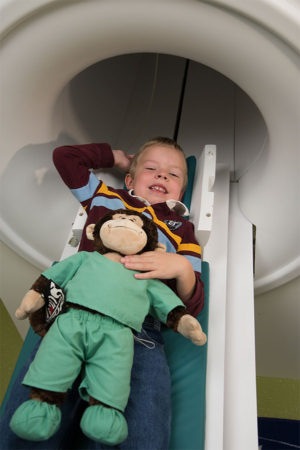How can I get involved in this study?
Not all of the participants in the Preschool Depression Study are eligible for the imaging portion. If you are eligible, you may be called by a member of our staff and invited to participate. If you are interested, there is a brief, five-minute health questionnaire you will be able to complete over the phone. We will work with you to find an appointment time that fits your schedule, and we do have late-afternoon and weekend times available. We try to schedule your MRI scan within 2 weeks of your annual office assessment.
What goes on during the scan?
The MRI scan consists of a few independent sections. First, your teen will complete a task in which they view images on a screen. Next, your teen will play a reward task in which they can earn up to an additional $17 based on their performance. Then, your teen will be asked to simply rest with their eyes open while we take images of their brain. Finally, your teen will watch a movie while we collect the final brain images.
What will you do with the results?
The study will investigate whether the shape and size of the brain areas, as well as the way the brain works, in children and adolescents who showed these symptoms are similar to or different than same-age children and adolescents who have never had symptoms of depression. By conducting brain imaging and some additional behavioral testing in addition to the testing you have already undergone, we can determine if the brain development of children and adolescents who show symptoms of depression is different from those without such symptoms. We will also be able to see whether certain brain structures and brain functions are associated with certain behaviors and abilities as they develop. The information that we collect may serve as a valuable resource for doctors and other clinicians and might tell us something about how depression develops.
Where can we find information about the study results?
We list the publishing information for all our papers on our publications page. Most of these papers can be accessed for free on PubMed.
How long will the assessment take?
Once you and your teen arrive, you will complete some paperwork and your teen will complete some training for the tasks they will complete in the scanner. This portion lasts 30 minutes. The scanner needs the teen to be still to get a good picture, but on average, the MRI scan will take approximately 1.5 hours.
How much is study payment?
Parents/guardians are paid $75, and teens are paid up to $142 for the scan.
What should I do if I have to cancel?
If you need to cancel your appointment, please call the office at 314-286-2730 as soon as possible.

Does the study include any invasive measures?
No. There is no contrast used for our MRI scans.
What is an MRI and what does it tell us?
The MRI will create pictures of your child’s brain using magnets. While in the MR scanner, your child will have a magnetic resonance spectroscopy (MRS) scan that measures the chemical composition of the brain and a functional scan that shows brain metabolic activity. There is no pain while in an MRI scanner, and no X-rays or other forms of radiation will be used.
Will my child’s data be kept confidential?
Your child’s data will be kept completely confidential. Your child’s name will never be used in any report of this research. Any information that identifies you as study participants will only be seen by approved research study staff.
Is there any danger to my child?
There is no known danger from obtaining an MRI scan. An MRI uses magnets to take pictures of your child’s brain. X-rays or other forms of radiation are not involved. The MRI scanner does make loud noises, but there should be no pain involved, and your child will be given headphones to lessen the noise.
Some children may be uncomfortable lying completely still in a scanner for 1.5 hours while the scan is occurring. Children who are afraid of tight spaces (claustrophobic) may not be able to complete the scan as the child is moved on a bed into the MRI’s center. You can see a picture of what the scanner looks like here.
More information on MRI safety
National Institutes of Health: Head MRI
This article notes that “To date, there have been no documented significant side effects of the magnetic fields and radio waves used on the human body”
Radiology Society of North American and the American College of Radiology: MRI (Head) You’ll notice that the only known risks are associated with contrast that is injected during some diagnostic MRIs, which is something we do not do in our study.
Where will the scan take place?
The scan will take place at 4525 Scott Avenue, St. Louis, MO 63110.
See map »